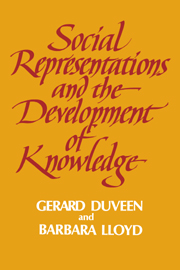Book contents
- Frontmatter
- Contents
- List of figures
- List of tables
- List of contributors
- Acknowledgements
- 1 Introduction
- 2 The underlife of the nursery school: young children's social representations of adult rules
- 3 A semiotic analysis of the development of social representations of gender
- 4 Children's representations of social relations
- 5 Social representations of childhood: an implicit theory of development
- 6 What is in an image? The structure of mothers' images of the child and their influence on conversational styles
- 7 The acquisition of reflexive social emotions: the transmission and reproduction of social control through joint action
- 8 From social cognition to social representations in the study of intelligence
- 9 Prototypes of the psychologist and professionalisation: diverging social representations of a developmental process
- 10 Social psychology and developmental psychology: extending the conversation
- Author index
- Subject index
10 - Social psychology and developmental psychology: extending the conversation
Published online by Cambridge University Press: 08 March 2010
- Frontmatter
- Contents
- List of figures
- List of tables
- List of contributors
- Acknowledgements
- 1 Introduction
- 2 The underlife of the nursery school: young children's social representations of adult rules
- 3 A semiotic analysis of the development of social representations of gender
- 4 Children's representations of social relations
- 5 Social representations of childhood: an implicit theory of development
- 6 What is in an image? The structure of mothers' images of the child and their influence on conversational styles
- 7 The acquisition of reflexive social emotions: the transmission and reproduction of social control through joint action
- 8 From social cognition to social representations in the study of intelligence
- 9 Prototypes of the psychologist and professionalisation: diverging social representations of a developmental process
- 10 Social psychology and developmental psychology: extending the conversation
- Author index
- Subject index
Summary
There are numerous sciences which study the way in which people handle, distribute and represent knowledge. But the study of how and why people share knowledge and thereby constitute their common reality, of how they transform ideas into practice – in a word, the power of ideas – is the specific problem of social psychology. This is by no means a secondary problem – witness the famous and conclusive remarks of Keynes:
But apart from this contemporary mood, the ideas of economists and political philosophers, both when they are right and when they are wrong, are more powerful than is commonly understood. Indeed the world is ruled by little else. Practical men, who believe themselves to be quite exempt from any intellectual influences, are usually the slaves of some defunct economist. Madmen in authority, who hear voices in the air, are distilling their frenzy from some academic scribbler of a few years back. I am sure that the power of vested interest is vastly exaggerated compared with the gradual encroachment of ideas.
(Keynes, 1936, p. 383)The processes through which ideas are transmuted are not necessarily the province of philosophers and writers. Such processes take place in an anonymous manner; they apply to traditions, to common sense or to professional groupings, and in each case the same things could be said. They enter into relations and actions which are still in the making, anticipating what should happen and justifying it once it has happened.
- Type
- Chapter
- Information
- Social Representations and the Development of Knowledge , pp. 164 - 185Publisher: Cambridge University PressPrint publication year: 1990
- 34
- Cited by



